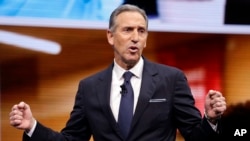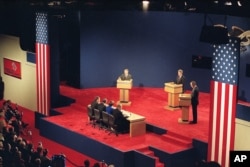A billionaire who made his fortune selling cups of coffee is stirring the political pot as he contemplates an independent run for U.S. president.
Howard Schultz, who formerly helmed the global Starbucks Corporation, announced in a television interview and on social media Sunday he might challenge incumbent Republican Donald Trump and whomever the Democrats nominate with a campaign outside the conventional two-party system.
"I love our country, and I am seriously considering running for president as a centrist independent," Schultz wrote on Twitter. "This moment is like no other. Our two parties are more divided than ever. Let's discuss how we can come together to create opportunities for more people."
In an interview aired on CBS' 60 Minutes, the self-described "lifelong Democrat" characterized Trump as "not qualified to be the president" and blamed both major parties for "consistently not doing what's necessary on behalf of the American people." He accused them of being "engaged, every single day, in revenge politics."
During the interview, reporter Scott Pelley predicted "an angry 8 p.m. tweet" from Trump reacting to Schultz.
The tweet actually came late in the 8 a.m. hour the following day.
Trump, whom some pundits believe might benefit from a Schultz run, essentially dared him to enter the contest, contending the 65-year-old New York native "doesn't have the 'guts' to run for President."
Trump said he had watched Schultz's televised interview and agreed with him that he is not "the smartest person."
The president, presumably referring to himself in the White House, said, "America already has that."
The president's tweet ended with a gibe that he hoped Starbucks "is still paying me their rent in Trump Tower" in New York City.
Many serious political observers are highly skeptical Schultz has any chance of defeating both the incumbent and the Democratic Party challenger.
"Timing is everything in politics, and Schultz's timing is terrible," contends historian and author Rick Shenkman. "This is the worst election in American history for a billionaire running as a billionaire for the presidency. Trump has discredited the idea of a businessman as president for a generation."
Others say the political establishment should not be so confident that an independent in 2020 has no path to victory.
"The process has been disrupted, and therefore anything is possible," asserts a Skidmore College history professor, Jennifer Delton, noting Trump's 2016 victory as a candidate with no political experience demonstrated "political parties in the U.S. are weaker today than any time since the Civil War."
Many Democrats fear Schultz would damage their candidate more than Trump.
One contender for the Democratic Party nomination, Julian Castro, who is a former secretary of the Department of Housing and Urban Development, said he does not think that a Schultz independent candidacy "would be in the best interest of our country" because it "would provide Donald Trump with his best hope of getting re-elected."
Former New York City Mayor Mike Bloomberg also is attempting to dissuade Schultz from running as an independent.
"In 2020, the great likelihood is that an independent would just split the anti-Trump vote and end up re-electing the President," Bloomberg said Monday on Twitter. "That's a risk I refused to run in 2016 and we can't afford to run it now."
Democrats are right to be worried, Shenkman told VOA, predicting Schultz "would pull moderate Republicans from the suburbs who otherwise would vote for the Democrat in a matchup with Trump."
Schultz's entry "could shield Trump from the consequences of his own misbehavior and incompetence," according to Shenkman.
Schultz has not directly addressed such concerns, replying in the CBS interview: "I want to see the American people win. I want to see America win."
Independents, sometimes running as candidates of third parties, have never won a presidential election in the United States. But they have in some elections — including in recent decades — determined the victor or altered a party's direction.
In 1968, former Alabama Gov. George Wallace, as the nominee of the anti-liberal American Independent Party, captured 13 percent of the popular vote and five southern states, something, according to Delton, "signified a huge transition in the electoral system, which was about consolidating the Democratic Party as the party of civil rights and diversity."
She noted the Democrats had previously been a party that included segregationists, and the defection of conservative Democrats in the South to Wallace helped to expand the Republican Party in the region, where Democrats had long dominated.
In 1992, conservative billionaire Ross Perot drew enough votes from incumbent Republican George H.W. Bush to help Democrat Bill Clinton become president.
Perot, who opposed globalization, was "a harbinger of Trump's economic nationalism," Delton told VOA.
In the 2000 election, consumer advocate Ralph Nader, running as the Green Party candidate, is blamed by many Democrats for siphoning enough votes from Vice President Al Gore to create a path to victory for Republican George W. Bush.
In 2020, according to Delton, "Republicans and Trump should be worried about the same thing. Independents, by their nature, siphon votes from both parties."
Despite that, Shenkman argues that Schultz "would be wasting his money," as the two-party system that has been in place in the United States since the 1824 election is not about to splinter.
"No independent has come close to winning," Shenkman said. "Wallace in 1968 and Perot in 1992 came closest, and they did not win, and neither would Schultz."




























